A leading scientific adviser to the British government said yesterday that he expects several coronavirus vaccines to have been approved by early 2021, allowing life to begin to return to normal.
The coronavirus causes the Covid-19 respiratory disease.
John Bell, professor of medicine at Oxford University, told lawmakers that Monday’s announcement by US pharmaceutical giant Pfizer that its vaccine candidate was effective in treating patients was likely just the start.
Bell, a member of the government’s Scientific Advisory Group for Emergencies (SAGE) said the news signalled other leading potential vaccines in late-stage trials could prove similarly effective.
“I wouldn’t be surprised if we hit the new year with two or three vaccines all of which could be distributed,” he told a parliamentary hearing. “I’m quite optimistic of getting enough vaccinations done in the first quarter of next year that by spring things will start to look much more normal than they do now.”
Bell added he believed there was a 70-80% chance of that scenario unfolding.
Pfizer said on Monday that tests of its vaccine developed with German partner BioNTech involving more than 40,000 people had been 90% effective and was a “critical milestone” in the bid to counter the virus.
It is one of 10 in late-stage trials around the world, which have so far shown promising results.
The British government has reserved 40mn doses of the drug, which Bell expects could receive regulatory approval within three weeks.
“We’re talking about mid-December I think we should be ready to administer this vaccine,” he added.
Britain has been one of the world’s worst-hit by the global pandemic, with more than 49,000 deaths from 1.2mn positive cases.
Italy meanwhile registered 35,098 new coronavirus infections over the past 24 hours, the health ministry said yesterday, steeply up from 25,271 on Monday.
The ministry also reported 580 Covid-related deaths against 356 the day before – the highest daily death toll since April 14.
On that day, when the whole country was in lockdown during Italy’s first wave of the epidemic, there were 602 fatalities.
Norway has recalled Home Guard forces to patrol its land border as neighbouring Sweden reported another surge in Covid-19 cases that is straining hospitals and stretching testing to the limit.
Norway tightened coronavirus rules last week and extended border controls for another six months.
As a result the Home Guard said it would assist police controlling the vast border, as it did during the spring and summer.
“Civilian authorities do not have sufficient resources to enforce the new measures and have asked the Armed Forces for assistance,” the Home Guard – a rapid mobilisation force in the military focused on local defence and civil support – said in a statement yesterday.
The Swedish-Norwegian border is Europe’s longest and around 80,000 Swedes live and work in Norway.
Hungary’s lawmakers have granted Prime Minister Viktor Orban’s government a special 90-day mandate to rule by decree in an effort to curb a spiking coronavirus pandemic, and they approved new restrictions amounting to a partial lockdown.
Hungary’s government reported 103 new Covid-19 deaths yesterday, making it the third hardest hit country in Europe in terms of deaths per 100,000 people over the past 14 days, behind the Czech Republic and Belgium, European Union data showed.
Orban, signalling a shift away from his policy of avoiding tough restrictions in order to protect the economy, announced a limited lockdown from 12.01am (2301 GMT) today to avoid hospitals being overwhelmed.
“If we all work together we can make it through once more,” the conservative nationalist premier wrote on Facebook.
Bosnia’s autonomous Bosniak-Croat Federation will meanwhile introduce an 11pm-5am curfew from today after a sharp rise in coronavirus cases and deaths, officials said yesterday.
Bosnia, which also includes the autonomous Serb Republic, reported 1,605 new Covid-19 infections and 46 deaths yesterday, with a 9% rise from the same day last week.
The country of about 3.3mn people has recorded 65,024 coronavirus cases in total and 1,629 deaths.
Four judicial probes have been opened in France into the authorities’ response to the coronavirus epidemic, the Paris prosecutor’s department said yesterday.
The prosecutor opened a preliminary inquiry in June to determine whether any criminal offences might have been committed.
Denmark’s Prime Minister Mette Frederiksen apologised yesterday and admitted that there was no legal basis for a mass mink cull after a mutated version of the coronavirus was found in the animals.
Some farmers with healthy mink stocks had protested against the ordered nationwide slaughter, saying there was no legal foundation for them to kill the carnivorous mammals.
Denmark was the world’s biggest exporter of mink fur, with an estimated 15-17mn minks.
“Even if we were in a rush, it should have been completely clear to us that new legislation was required, and it was not. I apologise for that,” Frederiksen told parliament.
Copenhagen last week warned that the mutation, dubbed “Cluster 5”, could threaten the effectiveness of any future vaccine.
It said the mutation had jumped from minks to humans and infected 12 people.
Those cases were all detected in Denmark’s North Jutland region.

Health workers attend a 24-hour protest at the Erasme hospital in Brussels, to urge the government to increase staff as hospitals fill once again with patients suffering from the coronavirus disease. The signs read ‘Hospital in distress’ and ‘To save our hospitals is to save our lives’.
